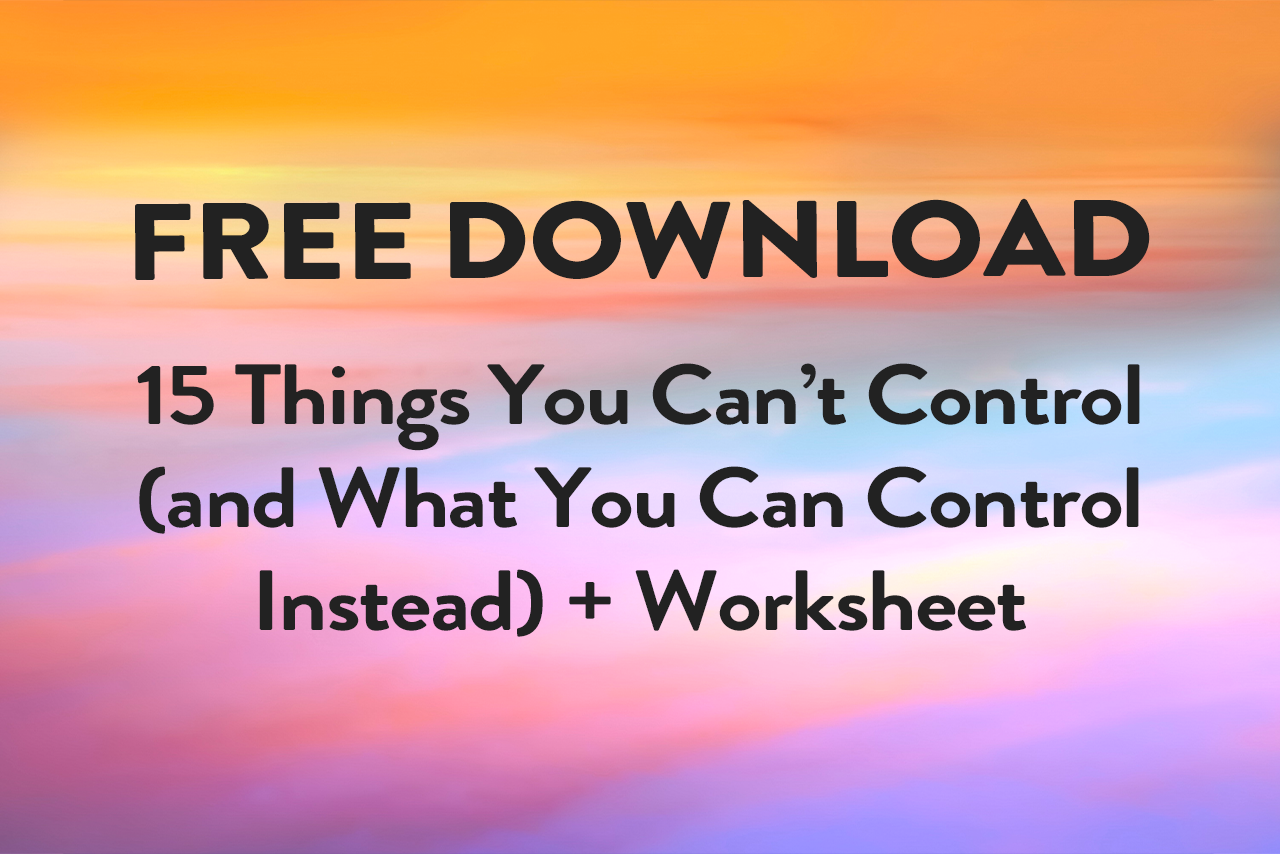This post is for anyone who stresses themselves out trying to control life. Which I’m guessing means it’s for most people.
It’s easy to convince ourselves we have power over things we don’t—as if we can force people and situations to go our way simply by trying or pushing harder.
The world would feel a lot safer if this were true. If people did what we thought was best, situations worked out as we believed they should, and nothing challenging or painful ever caught us off guard.
But some things are simply uncontrollable, and it’s exhausting and futile to obsess over them—not to mention disempowering, since we can’t control what’s in our power when we’re fixated on things that aren’t.
As a recovering control freak, I know this all too well. I also know how scary it is to let go and trust that things will somehow be okay, or that I can handle it if things fall apart.
These days I try to focus more on the latter, since that’s something I can control. I can’t control what’s coming, but I can control whether I feel strong enough to cope with it, and even make the best of it.
This is a big part of why I created Tiny Buddha’s Inner Strength Journal, and it’s why I decided to create this list including fifteen things we can’t control, what we can control instead, of what, specifically, we can do to own our power.
Since I think these are reminders that we all need often, I’ve created an abridged two-page PDF that you can print and hang for daily reference, along with a worksheet to help you let of control. You can access them both here.
1. You can’t control: What other people do.
You can control: Whether you participate in their behavior or enable them.
Some specific things you can do: Trust other people to make their own decisions and accept that you’re not responsible for their choices or the consequences of their actions. Consider that their choices and outcomes are somehow necessary for their growth. Recognize that you can accept their behavior without condoning it, participating in it, or enabling it. And set boundaries if their actions are hurtful to your physical, emotional, or mental health.
2. You can’t control: How other people see you.
You can control: How you show up in your relationships and how you see yourself.
Some specific things you can do: Make a list of traits you’d like to embody in your relationships—kindness, honesty, or integrity, for example—and check in with yourself throughout the day to ensure you’re being the kind of person you want to be. Take a little time every night to reflect on everything you did that day that made you proud.
3. You can’t control: How other people treat you.
You can control: How you internalize and respond to their treatment.
Some specific things you can do: Recognize that their behavior isn’t personal; it’s more about them and their own pain and limitations than you. Communicate how their behavior affects you, set boundaries around what you will and will not accept, and plan what you’ll do to enforce those boundaries and what you’ll do if someone crosses them. If the other person regularly treats you with callousness or disrespect, create distance in a relationship or end it altogether.
4. You can’t control: Whether other people like you.
You can control: How true you are to yourself.
Some specific things you can do: Remind yourself that no one is liked by everyone and that you don’t have to win anyone’s approval. You just need to be yourself so you can find likeminded people—people who accept and appreciate you just as you are. Also, list what it means to you to be true to yourself and check in with yourself regularly to see if you’re adhering to your list.
5. You can’t control: What other people think, feel, and believe.
You can control: How you engage about your different opinions, feelings, and beliefs.
Some specific things you can do: Set boundaries around conversations (which topics you won’t discuss, or what you’ll do to stay calm when hot button issues come up). Remind yourself that it’s not your job to change people’s minds. Look for common ground—something you can both agree on, even if you think differently. And remember that you don’t need to see eye-to-eye on everything to have a strong relationship; you just need to respect each other.
6. You can’t control: How other people internalize things you say and do.
You can control: Your intentions and how you respond when you unintentionally hurt someone.
Some specific things you can do: Communicate how you feel if you fear you’ve upset someone and clarify your intentions if you think there’s been a misunderstanding. Also, trust that other people will tell you if they’re upset, and recognize it’s not your job to read their minds if they don’t speak up.
7. You can’t control: What happens to other people.
You can control: How you show up for them when things get hard.
Some specific things you can do: Acknowledge that struggles help us develop strengths and can lead to pride and purpose, so you don’t need to shelter anyone from pain. When they’re hurting, hold space for them instead of trying to save or fix them, and let them know you’re there, you care, and you want to help however you can.
8. You can’t control: Your thoughts and feelings.
You can control: Whether you attach to them, identify with them, or act on them.
Some specific things you can do: Accept that thoughts and feelings come and go, and they are never permanent. They also don’t mean anything about you as a person. Also, practice pausing before acting on a thought or feeling so you can respond from a place of calmness and clarity.
9. You can’t control: The things that have already happened.
You can control: What you do in the present.
Some specific things you can do: Note what you’ve learned from the things you wish you could change so you can do things differently going forward, starting now. Reframe the past to find the good in what happened. Make amends if you’ve hurt someone or write a letter (to send or not) to someone who hurt so you can work toward forgiveness.
10. You can’t control: Everything that’s going to happen.
You can control: How you strengthen yourself to handle the unknown.
Some specific things you can do: Schedule in your daily to-do list at least one activity to boost your mental and emotional health—like meditating, journaling, and connecting with your support system—so you feel capable of handling whatever comes at you. Tiny Buddha’s Inner Strength Journal offers a wide array of prompts, challenges, and exercises to help with this!
11. You can’t control: The outcome of anything you do.
You can control: Your efforts.
Some specific things you can do: Put in the time for anything that matters to you, even if it’s just a little every day. Focus on progress, not perfection, so you don’t end up feeling paralyzed. Lastly, remind yourself that you can only do your best, and your best is good enough; and that even if things don’t turn out as you hope, something good can come from the experience.
12. You can’t control: Your body aging.
You can control: How well you take care of your body and how you think about it.
Some specific things you can do: Prioritize sleep, drink water daily, eat a moderate, mostly unprocessed diet, and move your body a little every day. Focus on how well your body serves you and how it enables you to do things you enjoy. And remember aging is far better than the alternative—and as the saying goes, “a privilege denied to many.”
13. You can’t control: All aspect of your health.
You can control: The preventative health measures you take.
Some specific things you can do: Stay on top of doctor’s appointments and schedule an appointment if ever anything concerns you—don’t wait. Prioritize rest instead of pushing yourself to always be productive. Minimize exposure to toxins, quit smoking if you’re a smoker, and wear sunscreen regularly.
14. You can’t control: The inevitability of you getting hurt.
You can control: How you treat yourself when you’re hurting.
Some specific things you can do: Remind yourself that there’s no way to avoid pain because the act of avoiding itself is painful. Practice sitting with your pain instead of numbing it with substances or addictive behaviors. Talk to yourself as you’d talk to someone you love when they’re hurting, and practice looking for the gains in losses so that every challenge and setback feels meaningful.
15. You can’t control: The fact that there’s suffering in the world.
You can control: Whether you contribute to it or help alleviate it.
Some specific things you can do: Work toward healing your own pain (since hurt people hurt people). Speak up for those who can’t speak for themselves. When you see someone hurting, offer your non-judgmental presence and ask how you can help. Commit small acts of kindness every day. Lastly, donate your time, money, or resources to causes you’re passionate about.
—
I hope these reminders help you as much as they’re helping me! You can access the abridged printable list and Letting Go of Control worksheet here.
Also, just a reminder: For a limited time, you can get a free 318-page eBook—Tiny Buddha’s Guide to Overcoming Hard Times—when you preorder Tiny Buddha’s Inner Strength Journal through one of the vendors listed here.
About Lori Deschene
Lori Deschene is the founder of Tiny Buddha. She started the site after struggling with depression, bulimia, c-PTSD, and toxic shame so she could recycle her former pain into something useful and inspire others to do the same. You can find her books, including Tiny Buddha’s Gratitude Journal and Tiny Buddha’s Worry Journal, here and learn more about her eCourse, Recreate Your Life Story, if you’re ready to transform your life and become the person you want to be.
- Web |
- More Posts














 Though I run this site, it is not mine. It's ours. It's not about me. It's about us. Your stories and your wisdom are just as meaningful as mine.
Though I run this site, it is not mine. It's ours. It's not about me. It's about us. Your stories and your wisdom are just as meaningful as mine.